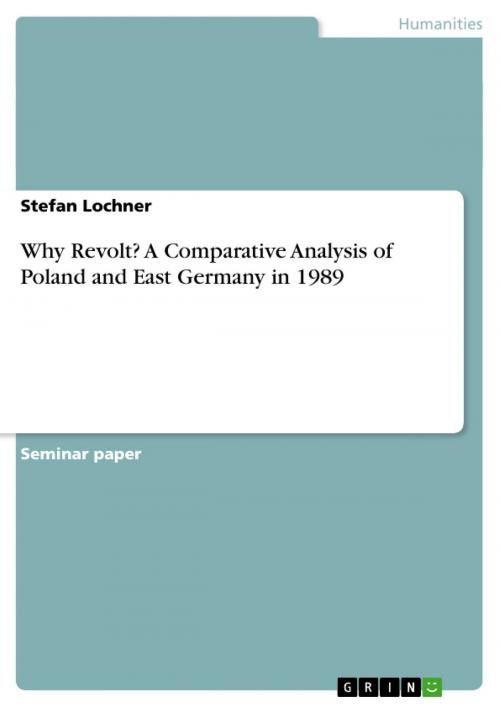Why Revolt? A Comparative Analysis of Poland and East Germany in 1989
Nonfiction, Social & Cultural Studies, Social Science, Sociology| Author: | Stefan Lochner | ISBN: | 9783656029588 |
| Publisher: | GRIN Verlag | Publication: | October 17, 2011 |
| Imprint: | GRIN Verlag | Language: | English |
| Author: | Stefan Lochner |
| ISBN: | 9783656029588 |
| Publisher: | GRIN Verlag |
| Publication: | October 17, 2011 |
| Imprint: | GRIN Verlag |
| Language: | English |
Seminar paper from the year 2004 in the subject Sociology - Political Sociology, Majorities, Minorities, grade: G (Good), University of Dalarna (Master Programme of European Political Sociology), language: English, abstract: The collapse of communism at the end of the 1980s was one of the most important occurrence in the 20th century. In only a few months - starting with the institutional compromises in Poland and Hungary and the non-violent revolutions in the GDR and ?SSR - the Soviet-led East European statesystem and later the Soviet Union as well, dispersed in a way and with such rapidy, nobody in the 'West' and 'East' believed to be possible. Real self-determination of the satellite states or indepenence of the former Soviet Republics and changes in the political and economic system were the consequences. At the highest historic level, the world´s geopolitical order changed dramatically, because the devision into two fields of interest was brought to an end and with it the Cold War. From a European perspective, after the downfall of the 'Iron Curtain' the opportunity was opened to fulfill the idea of a European Community, also in a much wider sense, and for Germany the over 40 year lasting existence of two states was repealed with the reunification. In the following passage of the main part I will try to explain why in Poland an institutional compromise was achieved, whereas in East Germany a non-violent revolution broke out. With references to Poland, we can speak of an institutional compromise because the 'impetus for change came from the elite, which undertook negotiations with the opposition over the shape of the new institutions', while in East Germany a revolution took place because 'the impetus for change came directly from the mobilization of a broad-based opposition engaged in non-accepted means of mass collective action; the result was systematic change in both the political and the socioeconimoc system'.
Seminar paper from the year 2004 in the subject Sociology - Political Sociology, Majorities, Minorities, grade: G (Good), University of Dalarna (Master Programme of European Political Sociology), language: English, abstract: The collapse of communism at the end of the 1980s was one of the most important occurrence in the 20th century. In only a few months - starting with the institutional compromises in Poland and Hungary and the non-violent revolutions in the GDR and ?SSR - the Soviet-led East European statesystem and later the Soviet Union as well, dispersed in a way and with such rapidy, nobody in the 'West' and 'East' believed to be possible. Real self-determination of the satellite states or indepenence of the former Soviet Republics and changes in the political and economic system were the consequences. At the highest historic level, the world´s geopolitical order changed dramatically, because the devision into two fields of interest was brought to an end and with it the Cold War. From a European perspective, after the downfall of the 'Iron Curtain' the opportunity was opened to fulfill the idea of a European Community, also in a much wider sense, and for Germany the over 40 year lasting existence of two states was repealed with the reunification. In the following passage of the main part I will try to explain why in Poland an institutional compromise was achieved, whereas in East Germany a non-violent revolution broke out. With references to Poland, we can speak of an institutional compromise because the 'impetus for change came from the elite, which undertook negotiations with the opposition over the shape of the new institutions', while in East Germany a revolution took place because 'the impetus for change came directly from the mobilization of a broad-based opposition engaged in non-accepted means of mass collective action; the result was systematic change in both the political and the socioeconimoc system'.















